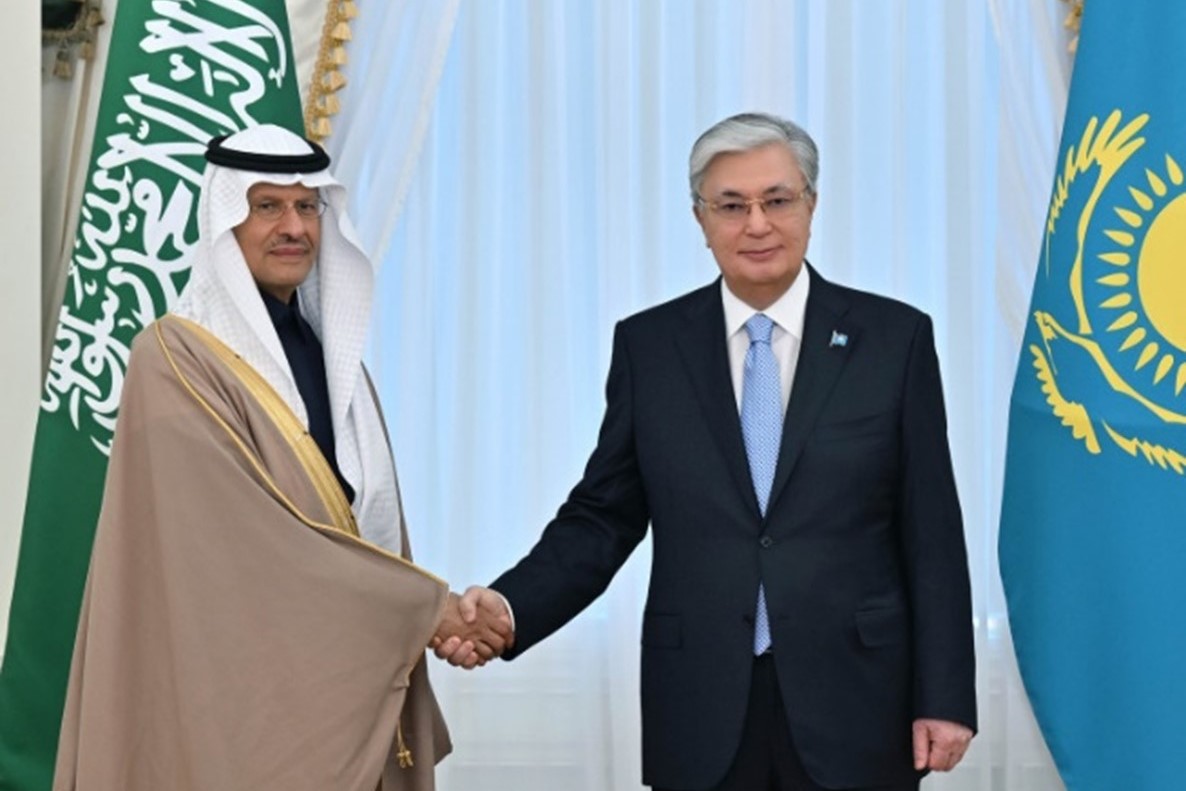This past week, the media paid attention to a state visit by Saudi Arabia’s Minister of Energy, where new renewable investment projects into Kazakhstan were announced, the announcement of a Kazakhstani-Azerbaijani joint fund to build and upgrade port infrastructure and logistics centers on the shores of the Caspian Sea, the announcement of a fund by USAID to aid in the development of small and medium-sized enterprises in Uzbekistan, the construction of various investment projects across Kyrgyzstan by Chinese firms, and the announcement that the Taliban will construct a Central Asian - South Asian electricity corridor to aid in rebuilding the energy infrastructure of Afghanistan.

Kazakhstan’s President Tokayev meets with Saudi Arabia’s Minister of Energy Abdulaziz bin Salman Al Saud in Astana. Source: Astana Times
Arriving in Astana this week with representatives from Saudi Arabia’s energy companies, Saudi Arabia’s Minister of Energy Abdulaziz bin Salman Al Saud announced that the kingdom would invest significantly in Kazakhstan’s renewable energy infrastructure in the coming years. During the visit, the Chairman of the Board of Directors of the Saudi company ACWA Power signed a memorandum of understanding with his Kazakhstani counterparts to construct a one-gigawatt wind turbine in the Zhetysu region of Kazakhstan (Qazinform). Over the course of the meeting, the Saudi side stated that there would be more plans for future development, and further announced that both sides would be cooperating in future green investment opportunities in Kazakhstan (Astana Times). This week’s meeting is part of a recent effort to build up the relations and people-to-people exchanges between the two states. A week prior to this meeting, both sides announced the creation of the Al Farabi Innovation Hub in Riyadh, which would serve to spread Kazakhstani tech startups’ reach to markets in the Middle East and North Africa (Astana Times).
On March 11, President Tokayev will travel to Baku, Azerbaijan, to participate in an official state visit and further develop relations between the two states. Nearly a week prior to the meeting, both states had already agreed on further developing port and logistics centers on both sides of the Caspian Sea. The two sides agreed to cooperate in developing renewable energy projects jointly, while also acknowledging the importance Azerbaijan plays as a transit point for Kazakhstani oil to Europe. Likewise, both sides agreed to cooperate on improving shipping terminals, namely the Alyat port in Azerbaijan (Astana Times). In addition to building off of the cooperative efforts achieved in the past week, Tokayev’s visit to Baku will feature the signing of bilateral cooperative agreements in economic cooperation, tightening relations between business interests in both countries, and he will also open a hospital that was funded through Kazakhstani investments (Tengri News).
This week, USAID announced an over US$17 million investment package in small and medium enterprises across Uzbekistan, which will be disbursed over the next five years. The Business Support Program seeks to bring together the private and public sectors in the country across four main industries: ICT, tourism, textiles and green development (Kun Uzbekistan). The initiative seeks further to provide $1 million grants for local enterprises that are aligned with USAID’s mission to provide investments for women-run and youth-led businesses in the country (Tashkent Times). The goal of the initiative is to foster a stable economic situation in the country that could also extend to enhancing prosperity across the Central Asian region.
Elsewhere, Iran and Tajikistan agreed to cooperate on investment initiatives from the development of power plants across the country, joint medicine production and cooperation on the international stage. At a meeting between both countries’ presidents, Iran’s Economic Minister stated his country’s willingness to cooperate with Tajikistan to share electricity and build geothermal, hydropower plants and wind turbine projects in the country (Asia-Plus Tajikistan). During a Family Health meeting held in Tehran this past week, Tajikistan and Iran agreed to work together to jointly manufacture pharmaceuticals in both countries and cooperate on educational exchanges between healthcare professionals, while Tehran agreed to export medical equipment to Tajikistan (Asia-Plus Tajikistan). Finally, at a ministerial meeting in Jeddah, Saudi Arabia, at the Organization of Islamic Cooperation summit, Tajikistan and Iran’s foreign ministers met to exchange viewpoints on the Israel-Palestine conflict and find areas to further cooperate with one another on the international stage (Tajikistan Ministry of Foreign Affairs).
The office of the Taliban’s Minister of the Economy announced this past week that Afghanistan will work on the completion of various energy projects in the next year to stabilize the country’s fragile energy situation. Among these projects are the construction of the Kamal Khan and Shah Wa Arus dams, a 200-megawatt wind turbine project in Herat, and the construction of a power transmission line extending from Herat to Turkmenistan (Tolo News). Likewise, Afghanistan announced the construction of a regional energy project with Kyrgyzstan, Tajikistan, and Pakistan. The CASA-1000 project, once completed, will transfer electricity from Kyrgyzstan and Tajikistan to Afghanistan to be sold further along the way to markets in South Asia (Ariana News). The Taliban’s Deputy Prime Minister for Administrative Affairs further stated that his government is going to invest in smaller-scale human development projects, like the development of schools, orphanages, and job opportunities to ensure future growth in Afghanistan (Bakhtar News).

